by Sr. Sheila Devane MMM Ireland 10.07.2024
 I find myself reading death notices quite often. Sadly, these days I now know more of the people written about than I’d choose to admit! Ageing brings many things; old age takes from us too. In Ireland, the main way we learn about someone’s death is through an online service called “RIP.ie” and I check for the recent deaths every now and then. So be it.
I find myself reading death notices quite often. Sadly, these days I now know more of the people written about than I’d choose to admit! Ageing brings many things; old age takes from us too. In Ireland, the main way we learn about someone’s death is through an online service called “RIP.ie” and I check for the recent deaths every now and then. So be it.
Yesterday I spent time with a friend; we chatted about lots of things: tennis, our families, and days gone by. I heard this story from her about the way a death was announced to her grandmother.
Over a hundred years ago in Ireland we certainly had no form of external communication with anyone except by letter. It was a time of mass emigration to USA, England, Scotland Australia, and Canada. Also, many missionaries were leaving their families to go all over the world never to return home again.
May Quinn, Sally’s grandmother, came from a large family & had two brothers who joined the Franciscans. Both left Ireland, one for Australia, the other for South Africa; neither ever returned to Co. Mayo. They wrote letters home telling of their missionary work; these took months to arrive and those written in reply on a special, green, light airmail page also took ages to reach their destination. So, it was all about getting the letter. This was a time even long before the telegram. People would frequently ask each other “did you get a letter?” In rural Ireland post was carefully watched by the postman or postmistress who knew who was receiving letters and who wasn’t. Confidentiality was different then too!
One morning May came to breakfast announcing to her youngest grandchild that Andy had died. The child knew he was her father’s uncle who she had never met, and that he was a priest in Australia, a very big country where there were kangaroos and other strange animals. The grandchild also knew Australia was hot, as the two photos they had showed him wearing sunglasses and a large, brimmed sunhat. She passed no remarks but on going outside met her father to whom she told “Uncle Andy has died.” He was shocked, this was his oldest uncle and one he had met before he left many years ago. What had happened? Did they get a letter?
May told her story; she had received no letter but Andy passed through her room the night before. The family were alarmed more at the announcement of the death than of the death itself. Was mother losing her mind? Did she dream? True? What?
About six months letter a letter did arrive, but not from Andy. It came from someone calling himself the Minister General in Rome, announcing the unexpected death in Perth, Australia, on the very day May had “met” Andy herself.
Death comes in many ways, death announcements too.
by Sr. Sheila Campbell MMM Ireland 08.07.2024
 The other day I came across a letter I had received about twenty years ago. Why did I keep it? Well, this is the story. The letter was from a lady called Margarida, and she was telling me that I had cared for her many years earlier while she was pregnant with twins. During her pregnancy she had suffered a heart attack. She had survived, but the pregnancy was at risk. I used to visit her regularly, checking her blood pressure, and generally supporting her during the pregnancy. She was writing to thank me for my care at that time and to let me know that her twin daughters were now both at university.
The other day I came across a letter I had received about twenty years ago. Why did I keep it? Well, this is the story. The letter was from a lady called Margarida, and she was telling me that I had cared for her many years earlier while she was pregnant with twins. During her pregnancy she had suffered a heart attack. She had survived, but the pregnancy was at risk. I used to visit her regularly, checking her blood pressure, and generally supporting her during the pregnancy. She was writing to thank me for my care at that time and to let me know that her twin daughters were now both at university.
I had absolutely no memory of who this lady was! Yes, I remembered working in that area of Sao Paulo, and it would have been typical of the kind of house visits I would have done. How could I not remember such a dramatic pregnancy? I began chastising myself for my bad memory and felt very guilty. Then I stopped and decided to keep the letter.
Now, why did I keep the letter? I think I kept the letter to remind myself that we do not always remember the good things we have done. Many of us remember the faults, the failures, the times when we didn’t come up to the mark. It is good to have a reminder that sometimes we did get it right, that our work for others has had an impact on the real lives of ordinary people.
We can all make a difference in other people’s lives by small acts of kindness. It doesn’t need to be grand gestures, sometimes just a smile, a comforting pat on the arm, a gesture of good will. The fact that we forget we have done well sometimes can also be a good thing. It is a reminder that to be kind and thoughtful is normal, natural, part of what God is calling us to be.
by Sr. Cecily Bourdillon MMM (1941-2023) Zimbabwe 06.07.2024
Editor’s note: Sr. Cecily wrote this during her early years as a doctor in Zungeru, Niger State, Nigeria. It was first published by MMM in 1977.
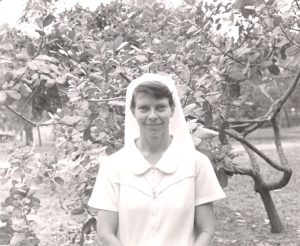 One morning during a busy clinic, a local traditional doctor came to consult us about a patient of his who had developed tetanus. We went with him and found a very ill man who had fallen from a palm tree and had three broken limbs and deep infected wounds. The patient needed hospitalization, but the traditional doctor would not agree, for there, he would not be able to carry out his own treatment.
One morning during a busy clinic, a local traditional doctor came to consult us about a patient of his who had developed tetanus. We went with him and found a very ill man who had fallen from a palm tree and had three broken limbs and deep infected wounds. The patient needed hospitalization, but the traditional doctor would not agree, for there, he would not be able to carry out his own treatment.
We eventually persuaded him and encouraged his help in cleaning up the wounds, removing his splints and leaves, re-setting the limbs and applying the plaster. The gentleness and skill with which he ran his hands over the deformed limbs and the tenderness with which he moulded them into their normal shapes, the patience and care with which he tended the patient after he had been comfortably placed in bed, the concern he showed for him was an inspiring experience.
We came to realise that amongst the villagers themselves are people with love and concern for their fellow villagers, people who are respected and trusted, people who know and understand their own, people who have an influence on the attitudes and traditions of those among whom they live. We know we must pass on our skills to these, so that our team may be augmented and that we may reach out to all people. The village midwife and any suitable person chosen from among the villagers and by the villagers, can be taught elementary aspects and the basic principles of curative, preventative and promotive medicine and so, with supervision, help bring health to all.
In a predominantly Moslem area, where only women may enter the homes, Mother Mary’s special concern for the care of mother and child urges us to enter these Moslem homes, to bring Christ’s healing and Christ’s love. Christ was a teacher; He is our teacher. He sends us out as His Father sent Him out. As we enter the homes to bring healing, we hope to make Christ present through our love and concern, bear witness to Christ’s love and to all to share in the good news of salvation.
by Sr. Margaret Anne Meyer MMM U.S.A. 04.07.2024
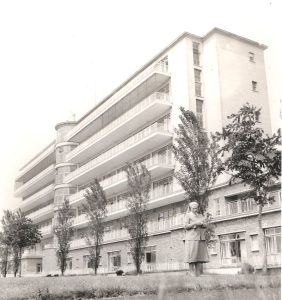 Yes, Conferring Day contained many lessons. It was a day “betwixt and between”. The brief visit at our house of studies in Rosemount brought home to us that we were beyond our strenuous medical course studies and not yet capable doctors. Our Hippocratic Oath both guided and bound us to do no harm. Thank God for this period of guidance from experienced doctors who held the patients at heart and did their best to relieve their painful situation. There was also more to do and more to learn. We were fortunate to have a good medical library and current issues of the British Medical Journal on display. We also enjoyed presenting a case at the Medical Club held every Monday morning. All departments participated.
Yes, Conferring Day contained many lessons. It was a day “betwixt and between”. The brief visit at our house of studies in Rosemount brought home to us that we were beyond our strenuous medical course studies and not yet capable doctors. Our Hippocratic Oath both guided and bound us to do no harm. Thank God for this period of guidance from experienced doctors who held the patients at heart and did their best to relieve their painful situation. There was also more to do and more to learn. We were fortunate to have a good medical library and current issues of the British Medical Journal on display. We also enjoyed presenting a case at the Medical Club held every Monday morning. All departments participated.
At that time, the hospital was only half built. A beautiful staircase lined the outer wall, and one could look out at the surrounding hills while walking to the various floors. I remember being overwhelmed one day with the number of patients for examination. I had tried to keep to what I had learned to do. However, a very thorough examination including the central nervous system was not always called for. I began to realize I could not spend so much time doing so on each patient. One day, as I gazed out the window, Psalm 121 came to me, “I look towards the mountains from whence shall come my help.” And plenty of help came to me from uttering that prayer. All the patients were seen in and helped in a good way.
I also liked the regularity of the convent life. were rung for the various prayers, and I liked joining in with the other Sisters when we were not on duty. We did not have beepers in those days, but the hospital tele system would resound all over and we would call the operator to see where we were needed. As we left the hospital, the Sister doctors would sign off on a sheet giving our next location. The operator would call for us there. For the first time, I had a telephone in my room so I could be called at night.
I found the night calls very exciting. Sometimes you would get a call that a patient was on the way, and they would not arrive until two or three hours later. At that time there were no Pediatric Registrars, so the Medical House Doctor would admit the sick children during the night and call the Pediatrician, Doctor O’Sullivan, who would prescribe treatment based on your clinical findings. I was also called for Casualty emergencies when the Surgical Team was in the theatre.
After some time, I got to know the patients very well. Many patients on the sixth floor, Male Medical, had chronic obstructive pulmonary disease. Some required tracheotomies and were hospitalized for a long time. I thought it would be good to see if there were any underlying factor causing so many men from Drogheda especially from Windmill Road, to suffer this condition. I asked Dr. Costello if I could return to the library of UCD, my medical school, to do some research on their condition. Dr. Oliver Mc Cullen drove me to Dublin and stopped off at Temple Street at a blacksmith’s shop to tell me this was the only shop left of its kind in Dublin. Many men got COPD from inhaling the fumes off the horse’s hoof when the hot horseshoe was applied. I marveled at this and his interest in teaching me. I cannot remember what I learned in the library, but Dr. Costello was impressed with my efforts and gave me a current edition of Cecil and Loebe. It was regarded as the Bible of medical knowledge. I was very pleased and grateful to him.
I remained fascinated with the whole experience of seeing a patient come to us very ill, listen to their story and make a diagnosis with their information, some lab tests and other diagnostic tests. Sometimes it was not so clear and what originally was thought to be the case did not help the patient very well, so other avenues were explored. Costello was a whiz at this process, and I learned very much from him.
The months continued until mid-October when it was time for Martha Collins and me to make Final Profession of Vows. Maura Lynch would make hers the following year as she had started Medical School as a second-year novice. You will hear all about this in another story.
by Sr. Patricia Lanigan MMM Ireland 02.07.2024
How many times someone has asked that, holding my hand as they say good-bye, emphasising the sincerity of their request.
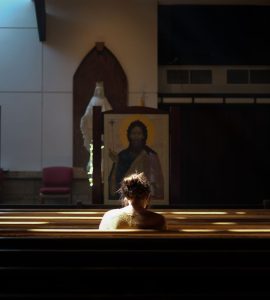 “Say a prayer… for my son/ daughter, my mother/ father, my relative/ neighbour”. Someone is sick, in trouble, facing examinations, maybe struggling to find a job, or house. Every day a list goes up outside the oratory, just where sisters pass, asking for us to remember them to the Lord in their need. And every day, the sisters carry the requests in their hearts, and aloud at Morning and Evening Prayer.
“Say a prayer… for my son/ daughter, my mother/ father, my relative/ neighbour”. Someone is sick, in trouble, facing examinations, maybe struggling to find a job, or house. Every day a list goes up outside the oratory, just where sisters pass, asking for us to remember them to the Lord in their need. And every day, the sisters carry the requests in their hearts, and aloud at Morning and Evening Prayer.
Today something wonderful happened – a thank-you email came in, accompanied by a lovely photo of a little girl who had a brain tumour successfully removed. The family said it seemed a miracle that the surgery and treatment were effective, and she seems totally fine now.
Sometimes we hear how people get on, more times our prayer goes into the hand of God and we know nothing more. Yet for us this daily intercessory prayer is important, a constant reminder that we are all part of God’s family, caring for each other.
As St Paul writes:
“Pray all the time, asking for what you need, praying in the Spirit on every possible occasion. Never get tired of staying awake to pray for all the saints; and pray for me” (Eph 6:18)
“Every time I pray for you, I pray with joy… There is no need to worry; but if there is anything you need, pray for it, asking God for it with prayer and thanksgiving, and that peace of God, which is so much greater than we can understand, will guard your thoughts and your hearts, in Christ Jesus” (Phil 1:3, 4:6-7)
Do we trust in the power of God, in the compassion of Jesus, who said: “Of course I want to [heal you], be healed” (Mt 8:3) – and the man with leprosy was cured at once. Do we ask the Holy Spirit to enable the medical staff to work to the full extent of their skill, in diagnosis, surgery and treatment? Do we pray that the drugs will work fully, with no negative side effects? Do we pray for the nursing and home care staff, that they may be gentle, patient and effective? Do we pray in thanksgiving for the GP who noticed something possibly abnormal, and recommended further investigation – and so early treatment for a potentially terminal illness was possible?
Are such specific prayers necessary? Probably not. But do they extend the boundaries of our hearts? Perhaps. In the meantime, I’ll just ask for the name of the person in need, and put them in God’s hands.
by Nadia Ramoutar MMM Communications Coordinator Ireland 30.06.2024
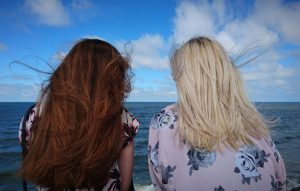 When we think of spiritual people and how they behave, having them stomping about angrily does not really come to mind. In fact, what is a spiritual person supposed to do with anger? Let’s be honest though, the world can be a maddening place especially when humans behave the way they do. I think of Jesus in the Temple just losing it and for good reason.
When we think of spiritual people and how they behave, having them stomping about angrily does not really come to mind. In fact, what is a spiritual person supposed to do with anger? Let’s be honest though, the world can be a maddening place especially when humans behave the way they do. I think of Jesus in the Temple just losing it and for good reason.
The MMMs work on some challenging issues in often compromised and overlooked parts of the world. I try to be a person of faith although there are occasions where I find myself angry at how badly some people are treated. In fact, I found myself wresting with frustration recently and I questioning my faith.
“Hope has two beautiful daughters; their names are Anger and Courage. Anger at the way things are, and Courage to see that they do not remain as they are.” Saint Augustine of Hippo famously said.
I came across this quote recently and it struck me as very powerful and seemed to cure me of my fear of anger. I also have a questionable relationship with living in hope as I think it’s best to live in reality, but often reality lacks imagination and leaves lots of room for improvement. Courage seems like a better characteristic when trying to decipher hope and digest anger.
I think the combination of anger and courage is what I needed. It is a cocktail for moving forward with a bit of oomph. We often try to manage our negative feelings which can lead to toxic positivity, in other words pretending everything is fine when it is clearly not.
I am uncomfortable with anger but when it is tempered with courage it feels more acceptable and even gives it a purpose. I am aware that humans are committing horrendous crimes against one another and often people hurt other people carelessly. When we are the ones being hurt it is not easy to know what to do – or if we should do anything at all really.
So, here in Saint Augustine’s quote we find a formula for moving forward. I also love that he said they were daughters – and I think of them then as Sisters. How progressive he was for his time frame that he gendered them as female. We tend to think of anger as a male like characteristic but often women shove down and repress their anger which is probably worse. Women need to be less tolerant of many things.
But, in fairness, there are things that are worth being angry about and we need to honour that sense of being so upset we can no longer accept it. It is acceptance of what is unacceptable that has led to so many issues in the world growing so far out of control. A sprinkling of anger, seasoned with some courage might do us good and give us some meaningful food for thought.
by Sr. Chris Gill MMM Ireland 28.06.2024
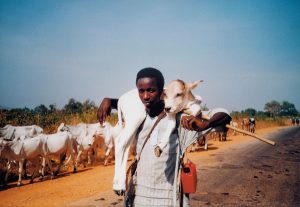 It was late evening when Mohammed Ibrahim arrived at the clinic in Fuka, northern Nigeria. He looked tired and weary after the long journey and had a bad cough for a long duration. Hannatu, our evening nurse, welcomed him and gave him an appointment for laboratory tests. She admitted him into the Tuberculosis Unit and from the nearby “take-away” got him some food. He was glad to have a bed and he enjoyed the company of other patients in the Unit, some of whom were Fulanis, his own ethnic group.
It was late evening when Mohammed Ibrahim arrived at the clinic in Fuka, northern Nigeria. He looked tired and weary after the long journey and had a bad cough for a long duration. Hannatu, our evening nurse, welcomed him and gave him an appointment for laboratory tests. She admitted him into the Tuberculosis Unit and from the nearby “take-away” got him some food. He was glad to have a bed and he enjoyed the company of other patients in the Unit, some of whom were Fulanis, his own ethnic group.
While taking his clinical history, I was amazed to discover that he was from Sokoto State, close to the Niger Republic border. I asked Mohammed how he had heard of our little clinic. He said: “I heard the news in Mecca.” He told me that when he was on pilgrimage in Mecca, performing the Hajj, his cough became very distressing. A Good Samaritan came to his aid with water and a seat to sit on. In the course of conversation, Mohammed told him how he had had the cough for years, has been to clinics and hospitals, but to no avail. The cough remained and grew worse.
His new-found friend told him that he too had had a cough like his but had been cured in Fuka. Mohammed immediately asked him if Fuka was in Nigeria; his friend nodded and gave him directions to the clinic.
As expected, Mohammed tested positive for pulmonary tuberculosis. He was emaciated and anaemic from many years of coughing blood. He was placed on an intensive course of anti-tuberculosis treatment for two months. These drugs are supplied free by the Niger State, in collaboration with the World Health Organisation.
Mohammed’s health began to improve after his other ailments, such as malaria and typhoid, were treated. When he was admitted he weighed just 45 kilos, and he was a very tall man! He stayed with us for two months and has made remarkable progress. Since that time his entire family has come for tests and been given appropriate treatment.
Other people from his area have also come for treatment, so Mohammed is one of our “Goodwill Ambassadors”!
 It was a cold morning. A small crowd was gathering outside our doctor’s emergency surgery but none of us knew what time the clinic would open as the website stated: .. “there will be changes on bank holidays.” However, there was no update informing us of the changed clinic times for today a bank holiday Monday.
It was a cold morning. A small crowd was gathering outside our doctor’s emergency surgery but none of us knew what time the clinic would open as the website stated: .. “there will be changes on bank holidays.” However, there was no update informing us of the changed clinic times for today a bank holiday Monday.by Sr. Sheila Campbell MMM Ireland 24.06.2024
 Many years ago, while I was a student in England, one of our Sisters got in touch with me. She was also based in England, but her job at that time was going around the various parishes and schools, talking about the missions and our medical missionary work. Sr. Eithne was a lovely friendly person, so how could I say ‘no’. Off I went the next weekend to the town where she was staying and early on the Sunday morning, we were to set off for the early morning Mass at a church which was a good distance away. “Be sure to be ready, “she warned me, “we have to make an early start.”
Many years ago, while I was a student in England, one of our Sisters got in touch with me. She was also based in England, but her job at that time was going around the various parishes and schools, talking about the missions and our medical missionary work. Sr. Eithne was a lovely friendly person, so how could I say ‘no’. Off I went the next weekend to the town where she was staying and early on the Sunday morning, we were to set off for the early morning Mass at a church which was a good distance away. “Be sure to be ready, “she warned me, “we have to make an early start.”
Whether it was the early start, or maybe she was just always like this, I do not know, but I found her very “scattered” the next morning. She was trying to dress, stuff leaflets into a bag, drink tea, and write down instructions for the journey all at the same time. She was a good driver, but flustered getting into the car, checking all kinds of things before we set off.
Eventually we arrived at the church – and then we discovered the lost shoes! At least we didn’t find them, that was the point. In her scatteredness she had placed her shoes on the roof of the car, meaning to carry them to the church and put them on before she left the car. The shoes must be a good distance back along the motorway by now.
Undaunted, in her full grey habit and red slippers she stood up in the church to give her talk. I would say we got a good collection that day, to help the poor Sister buy some shoes!
Another Sister, I will call Maeve, told me about the time a similar incident had happened to her. She was getting into the car, but distracted as she was watching a wedding party taking photos near a grotto in the convent grounds. She set off out the gate and down the hill towards the town. The street traders were all waving at her frantically and she was greeting them back, amazed that they were so friendly when they should be trading. Finally, one trader almost risked her life to step in front of the car to stop it. Maeve found that one of the wedding guests had left a cup of coffee and its saucer, on the bonnet of the car. She had driven down the hill and not a drop had spilt!
Now that I am getting old and forgetful, it is good to remind myself that memory lapses can happen at all phases of life!
by Sr. Joanne Kelly MMM Ireland 22.06.2024
 These lovely summer mornings I like to take my breakfast tea to the big window to look out to our lovely garden, with its lush foliage, variety of beautiful trees, and wild patches where there are blooms from all kinds of flowers and grasses. Right opposite are stately pine trees. I watched a woodpigeon. I first saw her as she alighted on a lamppost opposite the window. From there she swooped down into the garden and went round picking, picking, and picking. What she was finding to pick I don’t know!
These lovely summer mornings I like to take my breakfast tea to the big window to look out to our lovely garden, with its lush foliage, variety of beautiful trees, and wild patches where there are blooms from all kinds of flowers and grasses. Right opposite are stately pine trees. I watched a woodpigeon. I first saw her as she alighted on a lamppost opposite the window. From there she swooped down into the garden and went round picking, picking, and picking. What she was finding to pick I don’t know!
Then she flew back up to a particular place in the pine tree, landed on a flimsy branch and walked into the tree. In seconds she was out onto the lamppost and started the whole process again. Watching for some time I realised she must be feeding her young chicks. I wonder what size of family she had but there was certainly no quick way to feed them- no fast food there! I am somehow reminded of summer days at home when I was a child when we could roam around the country, finding birds’ nests, watching them carefully without disturbing them, and later being in the fields especially at haymaking time.
The weather was always unpredictable. At the time of saving the hay any fine day was precious. My father and the boys would stay in the field all day, literally “making hay while the sun shone” It was the job of my sister and I to help our mother keep them well fed. It was the time of World War 11, and everything was scarce, nothing much available. We had what we could grow and were blessed with that. So, about every two hours we brought food to the field. We made sandwiches, buttered lots of homemade soda bread (brought some jam too) and a big tight – lidded can of hot tea with milk and sugar already in it.
When the menfolk saw us coming, they moved to the shade of the nearest tree and sat down ready for their break. We always got a great welcome and there were lots of stories and fun as they enjoyed their big mugs of tea. As soon as the “workers” got what they wanted we had our own share and it tasted so special out there in the fresh air with the smell of the hay, butterflies flitting around and often a bee or a wasp buzzing about attracted by the jam.
There were no holidays abroad then or fast food either, but we enjoyed our summers. Our nearest phone was in the post office two miles away and only used for emergencies.
In recent years technology has made wonderful advances in everything in the world but I think some beautiful wholesome things are in danger of being lost on the way.
I am reminded of the Gospel when Jesus, surrounded by crowds, had been casting out demons, healing and preaching about love and forgiveness and they thought he was out of His mind. One commentator noted that it was world which was out of its mind and Jesus the only one who could bring the message of true love and healing.
Today it would seem the world is still out of its mind, running into destruction, and Jesus is still the only one who can save us. We know He has promised that evil can never overcome. But the task to prevent it is enormous and we can feel helpless.
I am reminded of advice our Foundress Mother Mary Martin was given in the early days when she felt the task was beyond her.
“Never fear when you feel weak before the task. We know well enough that it is God, not ourselves, who will do the work. Keep full confidence in God, do what you can and be as good an instrument as you can be in God’s holy hands “
So, like that little woodpigeon mother, we can continue searching and caring, spreading precious titbits of love, kindness and acceptance wherever we are, with all whom we meet and for as long as we can.
